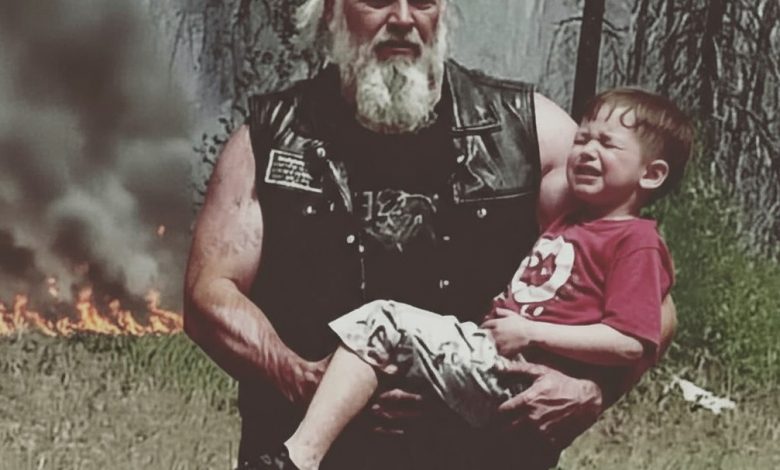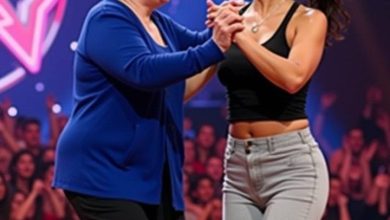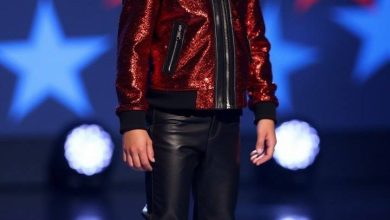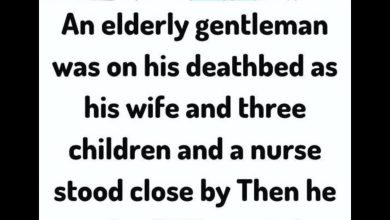Biker Walked Through Fire Carrying Disabled Boy After Everyone Lost Hope

The Biker Who Walked Through Fire
The massive biker carried the unconscious four-year-old boy through five miles of forest fire because the child’s wheelchair couldn’t make it down the evacuation route.
I saw him emerge from the smoke like something out of a legend—this leather-clad giant, his arms torn and bleeding from thorns, his $20,000 Harley abandoned somewhere in the flames, carrying my neighbor’s disabled son as if the boy were made of glass.
The boy’s mother, Sandra, had been screaming that her son was trapped at their cabin when the fire jumped the highway. The rescue crews said it was impossible—the roads were gone, the flames too fierce. But the biker didn’t argue. He just nodded once, revved his engine, and rode straight into the inferno.
Now, he was walking out of it.
Little Tommy was strapped against his chest with the biker’s own leather vest. The oxygen tank was tied to his back with melted bungee cords. His patches—“Savage Sons MC”—were scorched and curling from the heat.
“He needs medical attention right now,” the biker rasped, his voice rough from smoke. “I kept the oxygen going, but he’s been out for twenty minutes.”
Paramedics rushed in. Even unconscious, Tommy’s small hand clung to the biker’s shirt, refusing to let go. His mother fell to her knees, sobbing.
“They said no one could get through! The fire chief said the road was gone! How—”
But the biker collapsed beside the stretcher before she could finish. That’s when we saw the burns—his back blistered raw, deep cuts across his shoulders where he’d shoved through burning debris. His hands were blackened and cracked. Yet not once had he mentioned his pain.
“Sir, we need to treat you,” a medic said.
“The boy first,” he growled. “I’m fine.”
He wasn’t fine. But he sat there, bleeding and broken, refusing to take his eyes off Tommy.
That’s when I recognized him—Wolf, from the Savage Sons Motorcycle Club. The same group our neighborhood association had tried to keep off our roads. The same men we’d called troublemakers online when they bought that old warehouse outside town.
Sandra was still crying. “His wheelchair—it’s still at the cabin. It’s custom, fifteen thousand dollars. We’ll never—”
Wolf cut her off gently. “Your boy’s alive. That’s what matters.”
Then he pulled out his phone and started typing, fast.
Twenty minutes later, while the helicopter team prepped Tommy for transport, the rumble of engines echoed across the evacuation zone. Dozens of motorcycles appeared—Savage Sons, other clubs, lone riders. They came with trucks full of food, water, and medical supplies.
“What is this?” the fire chief demanded.
A big rider named Tank stepped forward. “Heard families lost everything. We’re here to help.”
But Wolf wasn’t done. Still refusing treatment, he handed his phone to another biker, showed him something, and the man gunned his engine, roaring back toward the flames.
“You can’t go back there!” the fire chief shouted.
Too late.
Wolf finally allowed the medics to work on him, but his gaze stayed fixed on the horizon. Sandra sat beside him, holding her son’s hand as they loaded Tommy into the helicopter.
“Why?” she asked softly. “You don’t even know us. We tried to drive your club out. Why risk your life for my son?”
Wolf’s eyes glistened. “Lost my boy ten years ago. Drunk driver. He was six.” His voice cracked. “Couldn’t save him. But I could save yours.”
Three hours later, as flames crept toward our evacuation center, a familiar roar filled the air. Wolf’s brothers returned—towing something behind their bikes.
Tommy’s wheelchair.
The seat was scorched, the paint bubbled, but it was intact.
“You could’ve died going back,” I said.
Wolf winced but smiled. “Kid’s gonna need it when he gets home. Lost enough already. Not losing that too.”
The video of him carrying Tommy through fire went viral within hours. The “dangerous biker gang” our neighborhood had feared became national heroes overnight.
And then came the moment that broke everyone’s hearts.
Wolf collapsed again, the burns and smoke catching up with him. As medics lifted him into the ambulance, he mumbled, “Did I get him out in time? Is the boy okay?”
When told Tommy was safe, he smiled weakly. “Good… good.”
The next morning, Tommy woke up in the hospital. His first words were, “Where’s the man who carried me?”
When doctors said Wolf was in the burn unit, Tommy begged to see him. They arranged a video call.
Wolf’s face, bandaged and swollen, lit up when the boy appeared on-screen.
“Hey, little warrior,” he said.
“You saved me,” Tommy whispered—clear, strong words his mother had never heard him say before. “You’re my hero.”
Wolf broke down sobbing. “You’re my hero too, buddy.”
From there, something extraordinary happened. The Savage Sons raised $200,000 for fire victims. They opened their clubhouse to displaced families—including the same neighbors who had once signed petitions against them. They rebuilt homes. They rebuilt trust.
And at the center of it all were Wolf and Tommy.
As they recovered, they became inseparable—both scarred, both smiling. Wolf wheeled Tommy through the hospital halls, the little boy wearing a tiny leather vest with a custom patch: “Bravest Warrior.”
When Wolf was discharged, twenty bikers escorted Tommy home to the temporary housing the club had built.
“Why are you doing all this?” Sandra asked.
Wolf knelt beside Tommy’s chair. “Because that’s what clubs do. We take care of family.”
“But we’re not your family.”
“You are now,” he said simply.
Three years later, Tommy is seven. He still can’t walk, but he’s thriving. Every Sunday, Wolf takes him riding in a custom-built sidecar. The boy who rarely spoke now gives school talks about not judging people by how they look.
“My bikers look scary,” he tells his classmates, “but they’re like dragons. They protect you.”
The old warehouse—the Savage Sons’ clubhouse—now has a wheelchair ramp, adaptive playroom, and hosts support groups for families with special-needs kids.
At the entrance to our rebuilt town, a new sign reads:
“Protected by the Savage Sons MC — Heroes Come in All Forms.”
Inside the clubhouse hangs Tommy’s thank-you card:
“Thank you for being my dragon. Thank you for carrying me when I couldn’t run. Love, your littlest brother, Tommy.”
Below it, scrawled in Wolf’s rough handwriting:
“Heroes don’t always wear capes. Sometimes they’re four years old and braver than any man I’ve ever known.”
That’s the truth about real strength. It’s not the leather or the bike—it’s the heart that chooses to walk through fire for someone else.
Even when the world has already decided you’re the villain.
Because real heroes?
They ride toward the flames. Not away.




